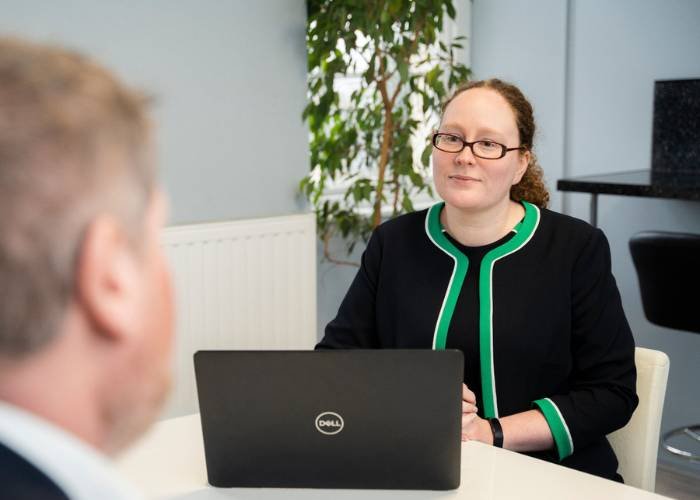Lasting Powers of Attorney Solicitors in Plymouth
A Lasting Power of Attorney (LPA) is one of the most valuable documents you can have in place for your future. It gives you control over what happens if you’re ever unable to make decisions for yourself because of illness, injury or age. With an LPA, you decide who should manage your finances, make health decisions and look after your affairs, ensuring your wishes are always respected.
At Nash & Co Solicitors in Plymouth, our specialist team helps people across Devon and Cornwall create LPAs that provide security and peace of mind. We’ll explain everything clearly, answer your questions and guide you through each step of the process, so you feel confident and supported from start to finish.
arrow_back Back to Wills, Trusts, Tax and Probate
Protecting your future and the people you care about
Creating an LPA isn’t about expecting the worst to happen; t’s about making life easier for the people who care about you most. When you make an LPA, you’re removing future uncertainty and ensuring that, if something ever does happen, your family won’t have to face stressful delays or difficult court applications just to be able to help you.
It’s a simple, thoughtful act that can make an enormous difference later on. Whether it’s giving your partner access to joint finances, allowing your children to make health decisions on your behalf, or ensuring your home is looked after properly, an LPA gives everyone clarity and reassurance.
Our team has helped many people in Plymouth, Devon and Cornwall to plan ahead with confidence. We’ll take the time to understand what matters most to you and make sure your LPA reflects your wishes perfectly.
Our related Wills, Trusts, Tax and Probate Services
What is a Lasting Power of Attorney?
A Lasting Power of Attorney is a legal document that allows you to appoint one or more trusted people, known as attorneys, to make decisions for you if you become unable to do so yourself. It ensures your affairs are looked after by people you choose and trust, rather than by the courts.
There are two types of LPA, and many people choose to have both.
Property and financial affairs LPA
This type of LPA covers everything related to your money, property and financial matters. Your attorney can:
Pay bills, manage bank accounts and collect benefits or pensions
Handle savings, investments and taxes
Buy or sell property, or deal with property maintenance
You can choose when this LPA comes into effect. Some people prefer it to be usable immediately after registration, while others want it to apply only if they lose capacity. If you run a business, you can also create a separate financial LPA for your business interests.
Health and welfare LPA
This LPA gives your attorney the power to make decisions about your medical treatment, care and day-to-day wellbeing, but only if you are unable to make those decisions yourself. It can cover:
Where you live or receive care
The kind of medical treatment you receive
Choices about diet, routine and personal care
Whether to consent to or refuse life-sustaining treatment
Having both LPAs in place ensures that every aspect of your life is covered, from managing your finances to safeguarding your wellbeing.
call Speak to one of our friendly Private Client Solicitors on 01752 827067
Why it’s important to plan ahead
Many people assume LPAs are only for later life, but they can be just as important for anyone at any age. A sudden accident, illness or change in health can happen without warning, leaving families unable to act without proper authority.
Without an LPA, even a spouse or child cannot automatically access your accounts, make medical decisions, or manage your property. They would need to apply to the Court of Protection for a deputyship order, which can take up to a year and involve significant legal costs.
By setting up LPAs now, you make sure the people you trust can act quickly and confidently on your behalf if ever needed. It gives both you and your family reassurance that everything is in order, whatever happens in the future.
Choosing your attorneys
Selecting your attorneys is one of the most personal and important decisions you’ll make when creating a Lasting Power of Attorney. The people you choose will have access to your finances or be making decisions about your care, so they need to be individuals you can trust completely.
Most people choose close family members, such as a partner or adult child, but you can also appoint trusted friends or a professional attorney, such as a solicitor. What matters most is that they are responsible, reliable, and have your best interests at heart.
When deciding who to appoint, it’s worth thinking about:
How well they understand your values and wishes
Whether they’re comfortable making difficult decisions
How well they manage their own affairs
Whether they live nearby and are easy to contact
You can appoint more than one attorney and choose how they make decisions. Some people prefer their attorneys to make all decisions together (jointly), while others prefer them to be able to act independently (jointly and severally). You can even set rules for different types of decisions, such as requiring all attorneys to agree on selling property but allowing them to act separately for everyday finances.
It’s also sensible to name replacement attorneys in case one of your original attorneys is unable to continue. This ensures that someone will always be able to step in to help if needed.
Our Lasting Power of Attorney solicitors in Plymouth can talk through all of these options with you, helping you make informed choices that reflect your family circumstances and future wishes.
When your attorneys can act
Before your attorneys can make decisions for you, your LPA must be registered with the Office of the Public Guardian (OPG). This process includes signing and witnessing the document and having it certified by an independent person (called a Certificate Provider) who confirms you understand what the LPA means and that you’re making it voluntarily.
A property and financial affairs LPA can be used once it has been registered, either immediately or only if you lose capacity, depending on what you decide. A health and welfare LPA, however, can only be used once you are no longer able to make decisions for yourself.
Our team can take care of all the registration paperwork and guide you through each step, ensuring everything is properly prepared and legally valid.
What happens if you don’t have a Lasting Power of Attorney?
If you lose mental capacity without having LPAs in place, your family or friends won’t automatically have the legal authority to manage your affairs or make decisions for you. Even your spouse or civil partner would be unable to access your bank accounts, pay bills, or make decisions about your care.
In these circumstances, your loved ones would have to apply to the Court of Protection for a deputyship order. This process can take between nine and twelve months, involves considerably higher legal fees than creating LPAs, and includes ongoing court supervision and insurance bond costs.
While your family waits for the court’s decision, they may find themselves unable to access funds for essential expenses, such as mortgage payments or care costs. It can be a stressful and frustrating experience at an already difficult time.
Having LPAs in place avoids all of this uncertainty. It ensures that, if something happens to you, the people you trust most can act straight away, without delay or extra expense. It’s one of the simplest and most effective ways to protect yourself and the people you love.
How our solicitors can help
At Nash & Co Solicitors, we’ve helped hundreds of individuals and families across Plymouth, Devon and Cornwall create Lasting Powers of Attorney that give them real peace of mind. We know this can feel like a big step, especially if you’re thinking about what might happen in later life. Our role is to make it straightforward, supportive and stress-free.
When you come to us, we’ll start by learning about your personal situation and what’s important to you. We’ll explain each type of LPA, answer your questions clearly, and give practical advice about who to appoint and how to structure the documents to suit your needs.
Once everything is agreed, we’ll prepare the paperwork, arrange for signing and witnessing, and handle the full registration process with the Office of the Public Guardian. If you ever need to update your LPA in future, we can help with that too.
You’ll have one point of contact throughout, and we’ll always be on hand to guide you. Whether you’re creating LPAs for yourself, your partner or a parent, we’ll make sure the process feels calm, clear and fully under your control.
To talk things through or arrange an appointment, call 01752 827067 or email lpa@nash.co.uk.
Frequently asked questions
In this comprehensive video series, our knowledgeable wills, trusts and probate experts will address the most common questions related to wills, trusts, tax considerations, and the probate process. We understand that these topics can often seem daunting, so we've compiled this resource to empower you with the essential information you need to make informed decisions.
-
They are legal document which give powers appointing someone else to manage your affairs if you become too unwell in the future to manage them yourself. There are two kinds, one covering financial affairs and one covering health and welfare decisions.
-
An attorney’s authority depends on the type of LPA you create. A property and financial affairs LPA allows them to handle financial matters such as paying bills, managing bank accounts, dealing with investments and maintaining property. A health and welfare LPA enables them to make choices about medical care, treatment and living arrangements if you cannot make those decisions yourself. Both types are designed to make sure your affairs are managed smoothly and in your best interests.
-
Yes. You can appoint several attorneys and decide whether they must act together or can act independently. For example, you may wish your children to act jointly when making major financial decisions but separately when dealing with day-to-day matters. You can also appoint replacement attorneys to take over if one of your original attorneys can no longer act, giving you extra protection.
-
The best time to make an LPA is now, while you have full mental capacity. Many people think LPAs are only needed in later life, but unexpected illness or accidents can leave anyone unable to make decisions. Once you lose capacity, it’s too late to make an LPA, and your family would have to go through the Court of Protection instead. Creating an LPA in advance is a simple way to make sure you stay in control of your future.
-
If you lose capacity without having LPAs in place, your family or friends will need to apply to the Court of Protection for a deputyship order to act on your behalf. This process can take up to a year and is far more expensive than setting up LPAs in advance. It also means the court, rather than you, decides who manages your affairs. In the meantime, your family may be unable to access your money or make important care decisions.
-
Once we have your instructions, it usually takes around 2 to 4 weeks to prepare the documents for signing. After submission, the Office of the Public Guardian takes approximately 4 to 5 months to register an LPA. During this time, we’ll stay in contact with you and keep you updated on progress.
-
Life-sustaining treatment includes medical interventions such as resuscitation, artificial feeding or ventilation that keep you alive. Within your health and welfare LPA, you can choose whether your attorneys should have the power to make these decisions on your behalf. We’ll discuss this carefully with you so that your wishes are clearly recorded and respected.
-
A certificate provider is an independent person who confirms that you understand the LPA and are making it freely. They can be a professional, such as a solicitor or doctor, or someone who has known you personally for at least two years. The role is to ensure there’s no pressure or misunderstanding during the process.
-
Yes, as long as you still have mental capacity, you can revoke your LPA or create new ones at any time. If your circumstances change, for example if you marry, divorce or wish to appoint different attorneys, we can help you make the necessary updates to keep your arrangements current and effective.
What our clients say
Related insights
Meet the Wills, Trusts, Tax and Probate Team
Get in touch
Fill out the form below and let us know whether you would like us to call you, or email you. One of our Medical Negligence team will be in touch as soon as we can.
If your enquiry is urgent then please call us on 01752 827076.
arrow_back Back to Wills, Trusts, Tax and Probate















